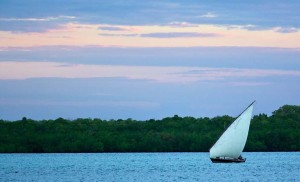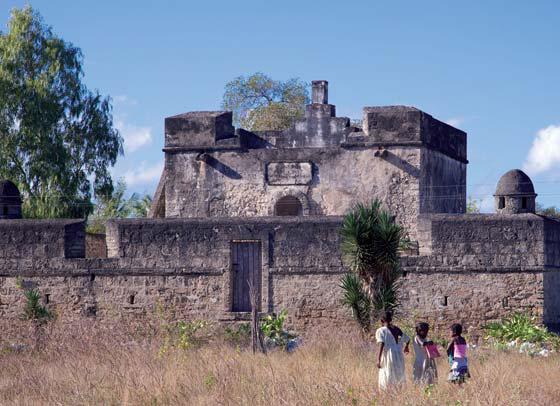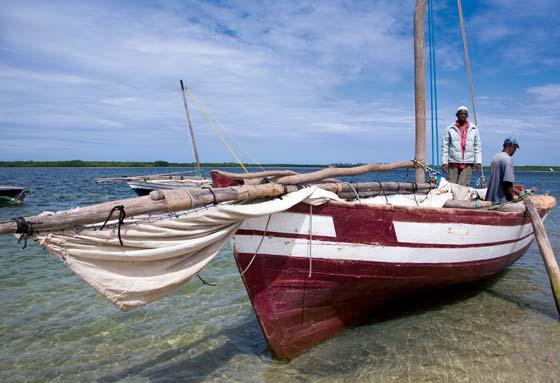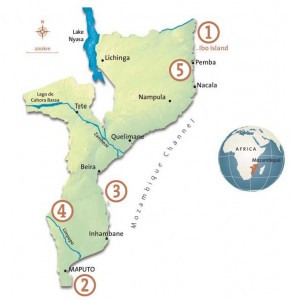 Ibo Island was once the thriving Portuguese Capital of Cabo Delgado province, Mozambique. But over the last century it has gradually flexed into ruinous beauty, becoming – tomy mind – one of the most haunting towns in East Africa. The sun beats relentlessly on this small remote spot,l ike it does most days, and creates the unchanging rhythm of the place. But as I set out to getmy first view of Ibo, rain threatened to dampen the tropical torpor. At the edges of the town I found a crumbling villa that looked as though it had been built from boiled eggs: large cowrie shells, embedded in the plaster,were bleached white by decades of sunshine. A nearby tumbledown garage was an optimistic addition, since there has not been a car on the island for years. Some houses were hollow husks, roofs long gone; the empty windows blindly gazed into streets that had vanished under a film of dust and a veneer of dry short grass. A huge Banyan tree poked through the top of a building,making the walls bulge as though heavily pregnant.With images like these, itwas easy to believe this was a ghost town, paralysed with equatorial rot.
Ibo Island was once the thriving Portuguese Capital of Cabo Delgado province, Mozambique. But over the last century it has gradually flexed into ruinous beauty, becoming – tomy mind – one of the most haunting towns in East Africa. The sun beats relentlessly on this small remote spot,l ike it does most days, and creates the unchanging rhythm of the place. But as I set out to getmy first view of Ibo, rain threatened to dampen the tropical torpor. At the edges of the town I found a crumbling villa that looked as though it had been built from boiled eggs: large cowrie shells, embedded in the plaster,were bleached white by decades of sunshine. A nearby tumbledown garage was an optimistic addition, since there has not been a car on the island for years. Some houses were hollow husks, roofs long gone; the empty windows blindly gazed into streets that had vanished under a film of dust and a veneer of dry short grass. A huge Banyan tree poked through the top of a building,making the walls bulge as though heavily pregnant.With images like these, itwas easy to believe this was a ghost town, paralysed with equatorial rot.
But this enigmatic reverie was soon broken by a curious child. Abu, happily chasing a bicycle tyre, looked like an animated silhouette as he skidded past me.We walked along the street together towards the cathedral.Collapsing and lonely,one of its bells had dropped from its carriage, and the once white walls were stained grey. Abu pointed to a small hole in the door, for me to peer through:in the darkness I could just make out a solitary man staring at an altar shrouded with cobweb drapes. I rattled the door,but he didn’t stir.He might as well have been dead. In the main square,someone played on a tin whistle – the repetitive series of notes belonged to a rusty hinge that swung discordantly in the heavy air.A man sat in the lacy shade of a wrought-iron verandah, turgid, barely able to summon the energy to cadge a cigarette as I passed. He had startlingly blue cataracts in his eyes, like iridescent scales from a huge fish,and sightlessly blinked his thanks. In the Catholic graveyard, a plump putto lounged on an elaborate tomb, clutching a crucifix.But its complicated marbling, coupled with years of neglect,meant that the cherub was now covered in an exotic eczema.A mausoleum,not much larger than a garden shed,was losing its roof.The door hung open and there, on a raised concrete bier, lay a splintered wooden coffin.
A skull stared defiantly back at me.Now tangled with weeds, the place was clouded by a smell of frangipani and decadent romance. The humidity soared after the storm that never was. Clouds dribbled and thunder rolled,but the sun won the battle.By noon, viscous humidity deadened the hungry town,slowing life to the faintest of pulses.Time had stretched. It was then that I found something that I didn’t know I had lost: the quality of time I remember as a child.The day became impossibly long, and minutes stretched to hours. Ibo’s sorcery meant that the small fragments of time I usually count in had no end,and tomorrow seemed very far away. The already weak heartbeat died as the sun got higher; the main streets became utterly deserted, and the small crumbling jetty had lost the children trying to catch fish (they all carry a little line and hook in their ragged pockets). A huge silence imperceptibly fell. I sat on the promenade – its broken railings like truncated battlements – and sagged in the heat like a mad dog staring across the grassy road towards the beach and distant cathedral.Even the sea had deserted the place. A part from Englishmen,only birds risked the sun at this time: they gathered on the mud flats like so many miniature women, picking over pools looking for shellfish. By late afternoon the sun lost its grip and life stirred again. Those not busy collecting water or dealing with necessities were to be found on a scrap of land adjacent to the small fort.
There I found a football match in full swing.A small wall – the grandstand – was the perfect vantage point to watch the surprisingly energetic game.But the chatter above the action was interrupted by the electronic tweet of a mobile phone and a thin, businesslike voice saying,“Yes, I’ll see you tomorrow.” Abu was talking amicably into an ancient Gameboy,and no doubt dreaming about the time he’d have his own real phone. Darkness falls quickly near the equator, and so I made my way past disembodied voices,occasional pools of light falling from storm lanterns, and whispers from invisible radios, to find supper. A huge whirring beetle, like a small helicopter,choppered in from the darkness, glancing past the limpid geckos, pale and almost transparent, policing the wall on the lookout for moths. As I sat down to eat, two bare light bulbs suspended at each end of the verandah theatrically dimmed – as if the house were full,everyone seated and the play about to start. The darkness was utter,physical and tarry – except for a dazzling canopy of stars overhead.The table, food,wall beyond,everything including myself, had quite vanished. I had fleetingly been devoured by this charismatic and beautiful place.
- Quirimbas Archipelago Island group to which Ibo belongs – with unspoilt, secluded beaches, spectacular coral formations and an abundance of birdlife.
- Maputo The sprawling capital of Mozambique is home to Nossa Senhora De Conceiao, the fortress and base of the eighteenth century Portuguese settlement, as well as Gustave Eiffel’s Casa Do Ferro – the rather hot ‘Iron House’.
- Bazaruto National Park Well known for its wonderful diving opportunities, the seas in this protected area are home to humpback whales,marine turtles, humpback and bottlenose dolphins, large game fish like marlins and barracudas and the endangered dugong.
- Limpopo National Park Linked to South Africa’s Kruger National Park and three Zimbabwean conservation areas, Limpopo is now home to 1,000 elephants, 147 mammal species and 500 bird species.
- Pemba The coastal town on the mouth of a huge bay has a lively atmosphere, beautiful beaches, and coral reefs. A tourist industry is fast developing here to provide holiday activities.
Where To Stay
- Ibo Island Lodge The best known hotel on Ibo Island itself spreads its nine rooms across three century-old mansions, located right on the waterfront, from where beautiful dhows set sail at high tide.
- Quilalea This secluded island resort in the Quirimbas Archipelago accommodates up to 18 guests in nine thatched villas built entirely from indigenous materials and handcrafted timber.
- Londo Lodge Private boutique hotel on Mozambique’s northern coast,where six villas look out to the ocean and coral reefs. It has a clifftop pool and private beach.
- Azura Lodge Located on the Benguerra Island in southern Mozambique, this lavish eco-boutique hotel contains 15 luxury beach villas, each with its own private pool,where modern chic combines with traditional Mozambican designs
- Lugenda Bush Camp Situated within the Niassa Reserve,among the Ngalongue Mountains, the Lugenda Bush Camp’s luxury tents are the perfect retreat for those with a love of wildlife, the wilderness and complete seclusion



